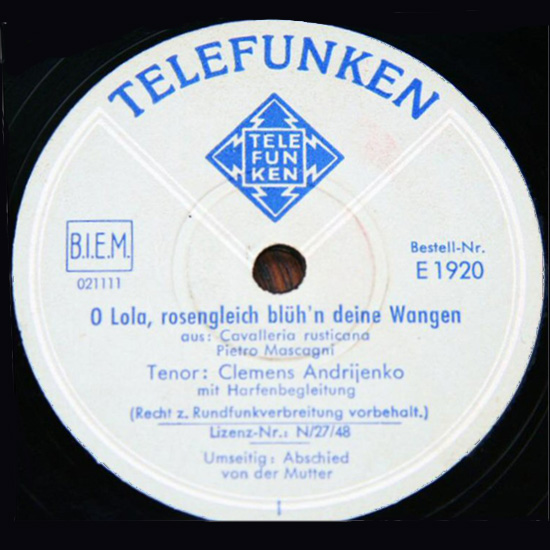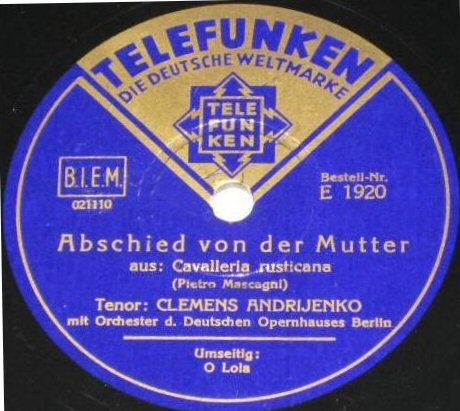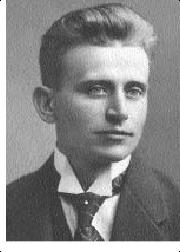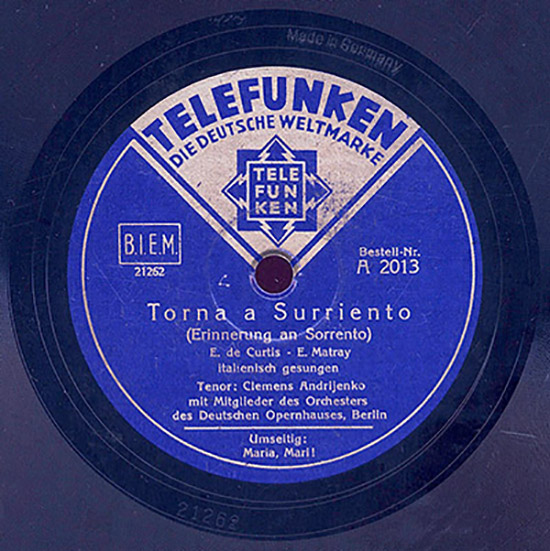Clemens Andrijenko, Ukraine's Caruso
by Adrian Bryttan
"The new Caruso ... exceptionally beautiful, sparkling tone quality ... lyrical tenderness ... master of the high C ... a golden
throat!"
Who earned such superb accolades from critics in Berlin, Paris and numerous other cities in Europe: Corelli? Del Monaco? Björling?
Pavarotti? The singer in the above reviews was Ukrainian tenor Clemens Andrijenko (1885–1967) and thankfully there now exists a small
cassette dedicated to his wonderful artistry. The recording comprises arias and songs recorded in 1927, 1936 and in 1956,
when Andrijenko was 72; it also includes an interview for Radio Kyiv with his daughter, Kalyna Cziczka-Andrijenko, who lives in
Munich, Germany.
From the very first notes it is clear that this is singing of the very highest control and musicianship. The voice was at its greatest
strength and beauty in the four selections from 1936 recorded in Berlin for Telefunken: Turiddu's serenade and aria (in German) and
two Neapolitan songs – "Oj Marì" and "Torna a Surriento" (in Italian). The color of the voice was exceptionally beautiful, with rich
overtones like a fine cello. His breath control makes it seem like there is power to spare, even in the most dramatic passages.
Above all, there is an attractive elegance to all the performances.
Some contemporary accounts stated that it was a large voice, like Enrico Caruso's. Renato Virgilio was Caruso's accompanist as well
as Andrijenko's, and he expressed the highest praise for the Ukrainian singer. Judging from this cassette, I would rather say his
singing was more in the direction of Beniamino Gigli and, in our time, Carlo Bergonzi. In his high range, Andrijenko creates a "mix",
with elements of falsetto and some lighter overtones. This is a very stylish manner of "singing on the breath", in contrast to the
full-voiced power of Caruso.
In any case, what is appealing is the honesty of the singing. Temperament and passion are all there, but never disturb the vocal
production and even line. There are no "cheap" effects or clumsy vocalizations during dramatic moments. Pitch, diction, dynamic
colors are beautifully controlled; the technique is always at the service of tasteful and expressive musicianship. How many tenors
can we say that about today?
Andrijenko's daughter, Kalyna, told me how her father also played the violin, studying his arias in this way. He was a successful
teacher as well, with an inquisitive mind, who investigated overtones and vocal techniques, and extended his studies to include
children and even dogs. What is amazing is the vocal technique and power in the recordings of "Tosca," "Pagliacci" and Ukrainian
songs when he was 72 years old!
No doubt he would be in high demand today. So why did he not achieve a greater fame? A look at his biography yields some answers.
Clemens Andrijenko was born in the town of Kopychyntsi in the Ternopil Oblast in 1885. He worked at first as a high school teacher
and married the daughter of Kyrylo Trylovskyi, founder of the Sich Society (1900), the paramilitary Ukrainian Sich Riflemen (1913)
and the Ukrainian Radical Party. From 1922 to 1926 he sang leading roles in the Lviv Opera Theater and was on the voice faculty at
the Lysenko Musical Institute. The recordings from this time reveal a tighter voice with a narrow vibrato.
In 1926 he emigrated to Berlin, where he progressively attained the full maturity of his singing. He started concertizing in Western
Europe, gathering superlative reviews. His wide repertoire ranged from the lyric to dramatic arias of Mozart, Bizet, Mascagni, Verdi,
Puccini and Wagner, Neapolitan songs and German art songs. Ukrainian composers and folk song arrangements were always included on his
programs.
Unfortunately, the political climate of the 1930s in Germany was turning away from non-Aryan "ausländers" and he was forced to
abandon the stage. He started a vocal instruction studio in Berlin and after the war continued teaching in Rothenburg until his death
in 1967. He was never able to return to his homeland.
More and more recordings of Ukrainian singers are being reissued. Salomea Krushelnytska was a shining star on the greatest operatic
stages of the world and sang with the best artists of her time. (It is criminal that the latest Pearl CD still refers to her as Polish!)
And Modest Menzinsky, her colleague who sang for many years at the Stockholm Royal Opera, had perhaps the most beautiful voice of all
Wagnerian tenors.
So it is a pleasure to recommend a cassette where one can learn about and hear Clemens Andrijenko, an artist who is on that same
international level.
Copyright © The Ukrainian Weekly, February 18, 2001, No. 7, Vol. LXIX
Andrijenko took part in the movie Die Stunde der Versuchung in 1936.
The actors were: Gustav Fröhlich, Lída Baarová, Harald Paulsen, Theodor Loos, Elisabeth Wendt, Bruno Ziener, Conrad Curt Cappi,
Margot Erbst, Margarete Lanner, and Hertha Guthmar. He appeared as Duca in the movie.
Reference 1
Reference 2
Reference 3




